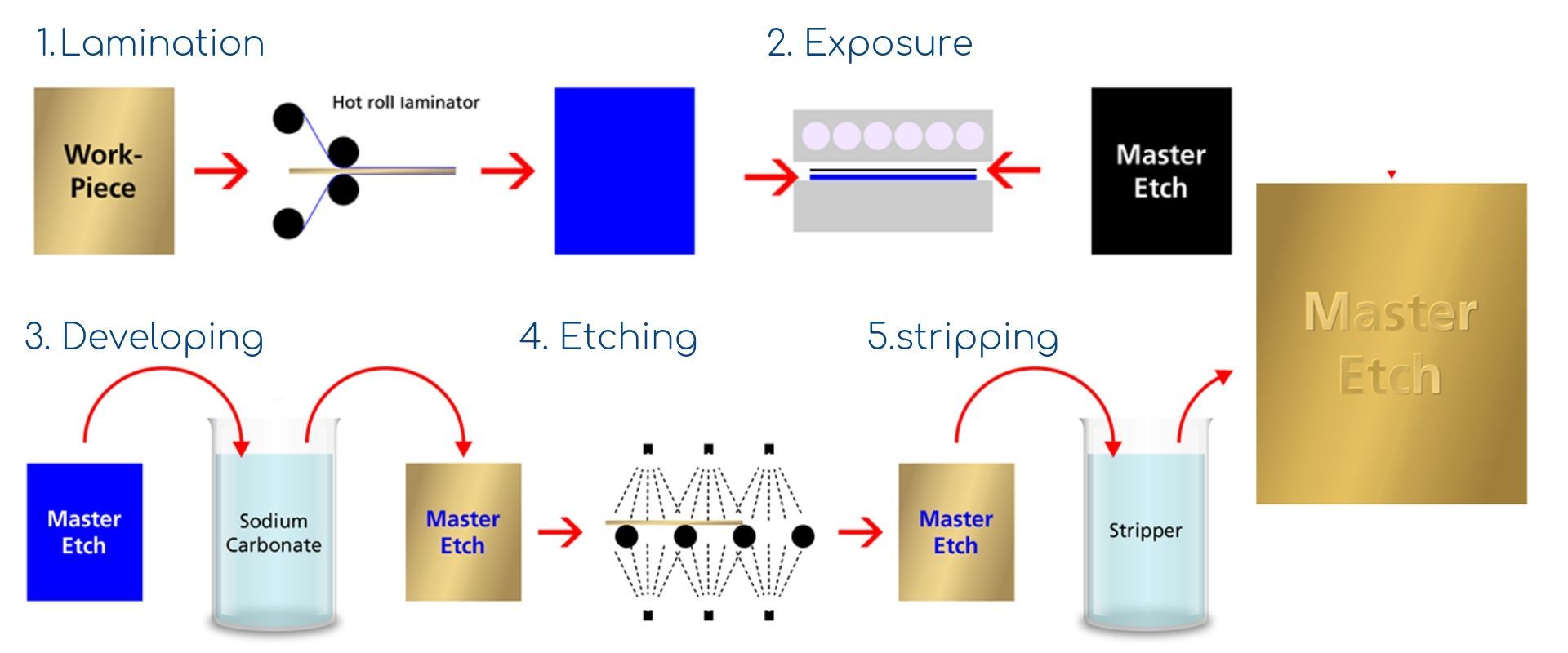CHEMICAL ETCHING PROCESS AND INFORMATION
Chemical etching is a method of engraving that uses a high-pressure high-temperature chemical spray to remove material to create a permanent etched image in metal. A mask or resist is applied to the surface of the material and is selectively removed, exposing the metal, to create the desired image.
An
etching machine
harnesses the corrosive reaction between the chemical and the material and amplifies the effect by heating the solution and spraying at high pressure. The chemical spray dissolves the unprotected metal areas to etch the material atom by atom for a smooth burr free finish.
UV PHOTOSENSITIVE FILM ETCHING PROCESS

This process, sometimes referred to as photochemical etching, is the most common method of etching metal. It is capable of reproducing an exceptional level of detail.
Other resist methods commonly used in metal etching include:
- Screen printed resists
- Laser engravable resist
- Vinyl resist
- Laser direct imaging
- Direct inkjet printed resists.
Masteretch's experience helps us to select the best process for your needs. We are able to supply all ancillary equipment required for the etching process.
WHAT IS CHEMICAL MILLING?
Chemical milling is a high precision process used to produce complex parts and components out of sheet metal. In the chemical milling process the artwork is applied on both sides of the material and is etched from both sides to cut all the way through the material.
It is a versatile manufacturing technique that retains hardness, temper, magnetic permeability, and other qualities without causing excessive stress on the material. Tooling costs are very low and design changes can easily be incorporated.
As an alternative to "conventional" methods, such as laser, water jet, stamping of wire EDM, chemical milling provides an accurate and economical solution for many precision metal applications.
Chemical etching has many benefits over hard tooling production processes such as stamping and die cutting. It offers greater design flexibility and much lower set up costs. The etching process causes no mechanical distress to the material leaving parts burr and stress free with no changes to the material grain structure or magnetic properties.
There is no costly tool wear as is associated with mechanical engraving methods or heat distortion as associated with laser engraving or cutting.
Chemical etching
is suitable for almost all types of metal and is capable of processing extremely thin material that can prove difficult to work with using other methods.
For signage and industrial label applications, chemical etching produce products unmatched in durability and offers a huge range of design possibilities.
- Repeatability for high volume production.
- Low tooling costs and greater design flexibility over hard tooling methods.
- Burr-free and stress free parts.
- Physical properties and material grain structure remains unaffected.
- Tight tolerances capable of producing components with complex geometries.
- Unmatched durability for signage and industrial labels
Most metals can be etched when paired with the correct etchant and equipment. Our customers use our equipment to etch a wide variety of materials including:
- Stainless steel
- Brass
- Copper
- Bronze
- Aluminium
- Titanium
- Nitinol
- Molybdenum
- Zinc
- Nickel
- Silver
- Gold
- Magnesium
- Inconel
- Nickel Silver
- Phosphor Bronze
- Beryllium Copper
- Mu Metal
APPLICATIONS FOR CHEMICAL ETCHING
<<< Back to top









